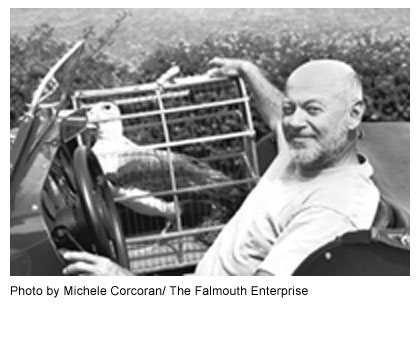"The Albatross About His Neck Was Hung"*
The following is from Woods Hole Currents, Volume 9, Number 3, 2002.
 "For describing the Atlantic circulation with bewildering simplicity," Senior Scientist Michael McCartney was named the latest winner of the prized and playful Albatross Award. Thee stuffed albatross—compete with wood-and-wire cage, a golden egg, and scrapbooks full of four decades of droll oceanographic humor—was presented to McCartney in February 2002 in Honolulu during the AGU Ocean Sciences Meeting.
"For describing the Atlantic circulation with bewildering simplicity," Senior Scientist Michael McCartney was named the latest winner of the prized and playful Albatross Award. Thee stuffed albatross—compete with wood-and-wire cage, a golden egg, and scrapbooks full of four decades of droll oceanographic humor—was presented to McCartney in February 2002 in Honolulu during the AGU Ocean Sciences Meeting.
According to custom, the bird was presented at a remote science meeting in order to test the logical skills of its new keeper. McCartney's odyssey through the airport—which included purchasing airfare for the bird—lasted hours, invoked puzzled and disapproving stares, and shut down an entire baggage screening line. The highlight of the voyage was a visit to a restaurant, where McCartney was informed, "You can't bring live animals in here!" When he pointed out that the albatross was hardly living, the waitress told him, "You can't bring dead animals in here!"
"From its first hatching, as the name implies, the award was intended to confer a mixed blessing on the recipient, partly out of the Founding Fathers' sense of fun, and partly out of the feeling that the recipient should be smart enough to cope," said Robert Dickson, previous recipient of the award and a physical oceanographer from the UK's Centre for Environment, Fisheries, and Aquaculture Science. The Albatross is given periodically to "someone with an Albatross-like ability to make conceptual leaps on the scale of an ocean.
"Mike McCartney meets the case admirably," Dickson noted in his citation. "Since the 1970's, Mike has produced a succession of landmark papers to describe...how the important elements of the Atlantic circulation form and move and change. At their mightiest, vast data sets are distilled down to their essence to yield novel, yet essentially simple, full-ocen perspectives...The reason we feel obliged to qualify such simplicity with the term 'bewildering' lies in the level of detail that accompanies it, so that conscientious readers can find themselves wading through drifts of detail they never thought they would ever need to know, and probably wouldn't. And as a result—how shall I put it?—you edon't get many of Mike's papers to the pound."
The selection panel—made up of past Albatross winners and known as American Miscellaneous Society—also considers "signs that the Award and the Awardee are likely to survive one another."
"As reguards his ability to look after such a fragile creature n its delicate structure of wood and wire, I need only point out that Mike himself has these several years lived in a succession of equally delicate structures of wood and wire—his sailboats Wampeter, Plumbelly, and Tresarus," Dickson added. "His dark blue Morgan convertible means he even drives a delicate sturcture of wood and wire, so the bird will certainly feel at home if it can be kept above water.
*From Samuel Taylor Coleridge's "Rime of the Ancient Mariner"
Partial List of Past Albatross Awardees
| 1959 | Gordon Lill, John Knauss, and Arthur Maxwell, for conceiving the Award. | 1976 | Sir Edward Bullard, for unintelligible geomagnetism. | |
| 1960 | John Swallow for innovative measurements of ocean currents both AC and DC. | 1979 | J. Tuzo Wilson, for making faults run backward. | |
| 1963 | Victor Vacquier, for displacing the Pacific Ocean by 700 miles. | 1982 | Sir George Deacon, for fathering Margaret and the Institute of Oceanographic Sciences. | |
| 1966 | Henry Stommel, for having abandoned Oceanography's most cherished chairs. | 1987 | Paul Scully-Power, for finding a way to observe the ocean without going to sea. | |
| 1968 | Sumner Pike for the study of the oceans and other liquids after 5:00 PM. | 1988 | Joe Reid, for his outrageous insistence that ocean circulation models should bear some resemblance to reality. | |
| 1970 | Bill von Arx, for contributions and confusion resulting from the GEK (also for using big words). | 1991 | Michele Fieux, for energetic efforts in international and interocean exchange. | |
| 1973 | Roger Revelle, for coveting the Bird over all other awards. | 1998 | Bob Dickson, for attempting to stem the flow through the Denmark Strait with a weir of current meters. |